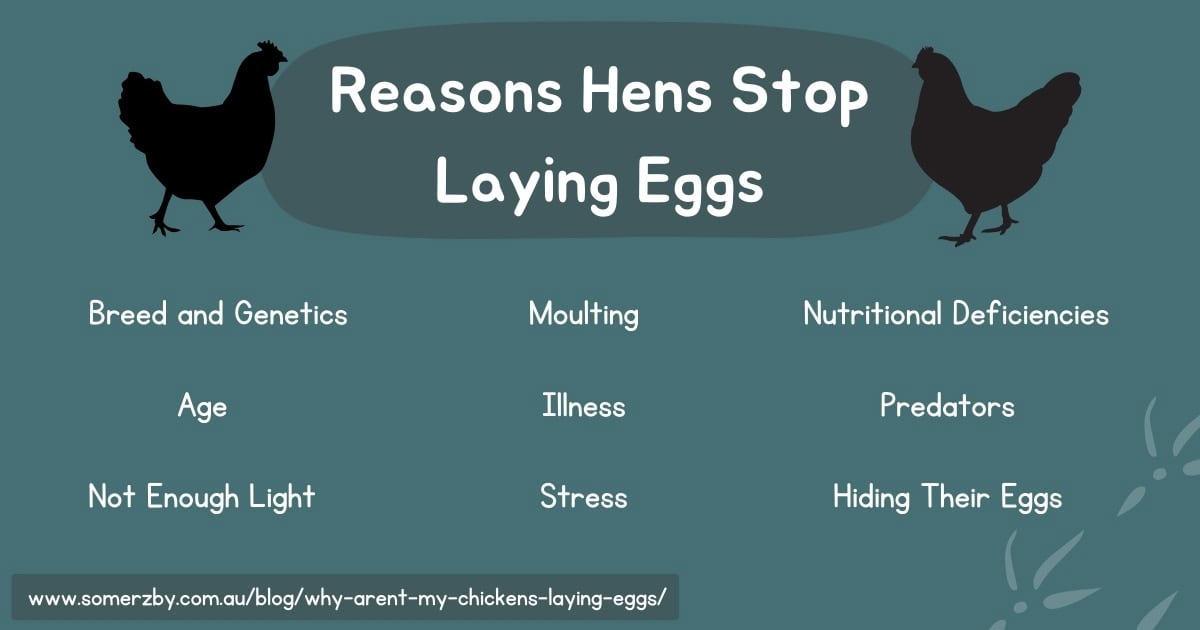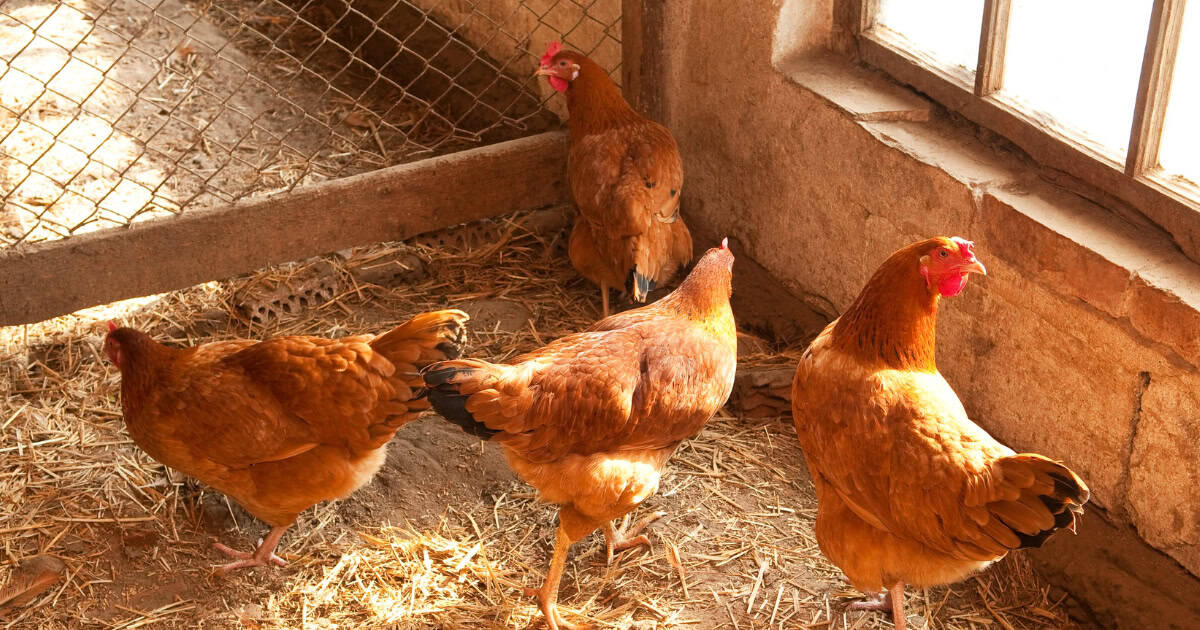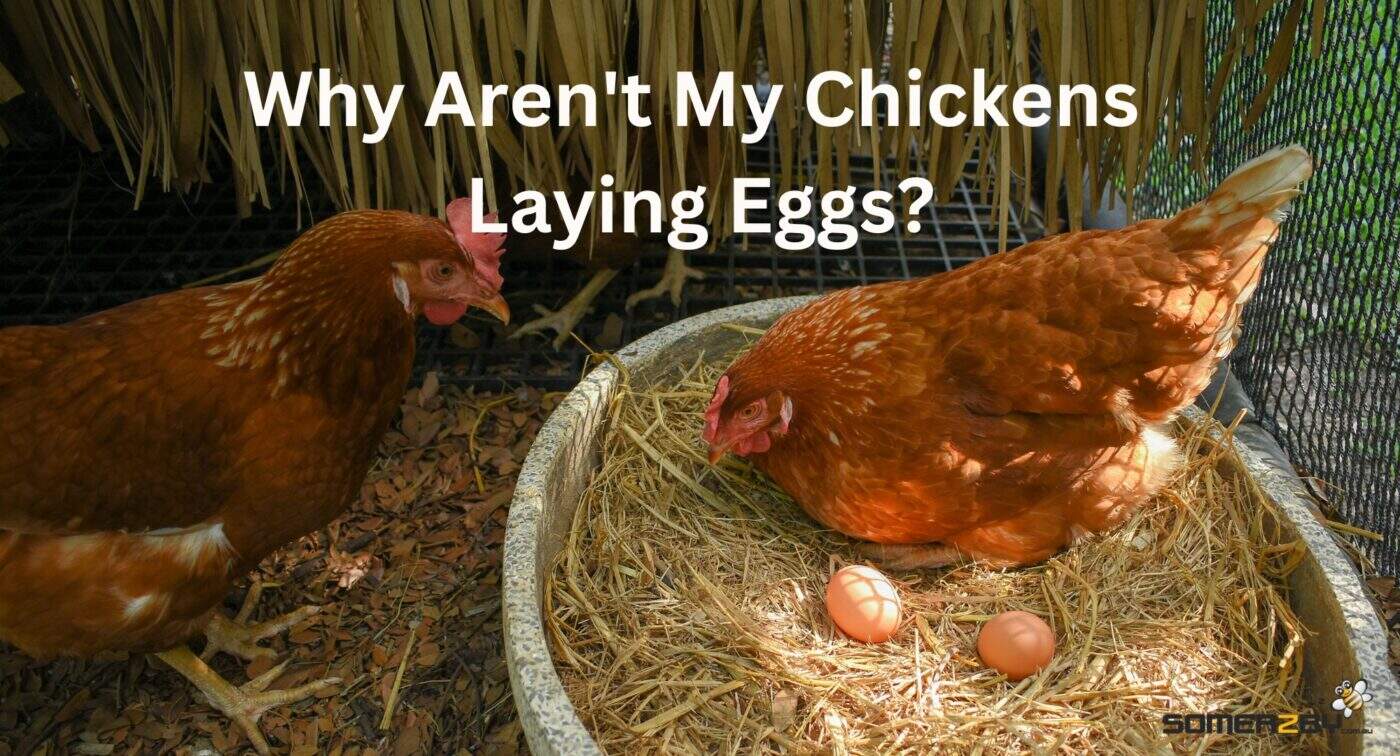Chickens, Info Guides
Why Aren’t My Chickens Laying Eggs?
Are your hens no longer laying eggs like they used to? It can be frustrating and a little worrying, especially if you’re not sure why it’s happening. The good news is, there’s usually a simple explanation.
In this blog, we’ll walk you through the most common reasons chickens stop laying eggs and what you can do to help them start laying again.
Key Takeaways
- Chickens stop laying eggs for many reasons, including age, breed, moulting, illness, stress, poor diet and lack of light.
- Your chickens may be laying eggs but they are hiding them or predators are eating them.
- Work through each possible cause one by one—this will help you identify the issue and find the right solution.
Common Causes and Solutions for Chickens Not Laying Eggs
If your hens stop laying eggs, there could be several possible reasons. Use the list below to explore the most common causes and work through the solutions one by one to identify what might be affecting your flock.
|
Cause |
Solution |
|
Breed and Genetics |
Purchase breeds known for their egg laying abilities. |
|
Age |
Accept that hens usually stop laying at 4 years old. |
|
Not Enough Light |
Fewer eggs are normal during winter. |
|
Moulting |
Feed your laying hens extra protein while they are moulting. |
|
Illness |
Contact a vet for advice and treatment. |
|
Stress |
Avoid sudden changes and loud noises. Keep predators away. |
|
Nutritional Deficiencies |
Feed your hens a balanced diet that is high in calcium and protein. |
|
Predators |
Predator-proof your coop, including small wire mesh on the sides and a solid base. |
|
Hiding Their Eggs |
Encourage hens to lay in their nesting box with soft bedding. |

Breed and Genetics
Some chicken breeds lay more eggs than others.
Commercial chicken breeds such as Isa Browns and Hy-Line Browns have been selectively bred for egg production. These breeds can lay between 250 and 300 fresh eggs per year. Egg production slows during winter but rarely stops completely.
These breeds typically mature faster, meaning they will hit laying age sooner but also “retire” earlier.
Some heritage breeds also lay up to 250 eggs per year, including Australorps, Rhode Island Reds and Leghorns. These breeds generally continue to lay for a longer time, with some continuing to regularly lay eggs until they are five years old.
Poor layers include Silkies, Brahma and Polish hens.
Solution:
When you first decide to purchase chickens, do your research and choose a breed known for laying a large number of eggs.
If you already own chickens and are concerned that they are no longer laying, research what is normal for their breed.
Age
Most hens will reach laying age at around four or five months. They will lay the most eggs in the first few years.
At around three years old, they will gradually begin to lay fewer eggs. Older hens will stop laying completely at around five years old.
This can vary between breeds.
Solution:
If your hens have suddenly stopped laying, consider whether their age could be a factor.
Some hens will stop laying at four or five years old but then live until they reach eight years old. So when you buy chickens, consider that you are committing to owning them for their whole life even when they stop producing eggs. They are a pet first and an egg producer second.
Not Enough Light
Hens need adequate hours of light to stimulate their reproductive system. They will naturally lay more eggs in summer (when there are more hours of daylight) and lay less in winter (when the days are shorter).
Solution:
Some commercial egg operations will use artificial lights to trick their hen’s bodies into thinking the days are longer and therefore they lay more eggs.
It is debated whether supplemental light is ethical or not. But we don’t recommend trying this at home. Fewer eggs produced during the winter season is a natural part of chicken keeping and should be accepted as part of the chicken owning experience.

Moulting
Moulting is the process of shedding old feathers and growing new ones. Most hens will usually do this once a year during autumn.
During moulting, a hen’s body uses all their energy and available nutrients to grow feathers. This usually means they don’t have enough left over to form eggs and will stop laying temporarily.
Solution:
During the moulting process, support your flock by providing extra protein in their diet. We recommend dried mealworms, sunflower seeds and cooked chicken eggs.
This will help their feathers grow and may help egg laying commence sooner.
Illness
Unfortunately, just like any other living thing, chickens can get sick, impacting their ability to lay eggs.
Chickens will slow or stop their egg production if they’re trying to fight off an ailment. This could include parasites (such as mites and lice) or viruses (such as Avian Influenza or Marek’s disease).
Laying will also stop if your hen is experiencing egg binding – when an egg gets stuck in the cloaca and she is unable to push it out.
Solution:
Prevent chicken health problems by feeding them nutritious food and keeping their enclosure clean.
If you suspect your chicken may be unwell, contact your local vet immediately for advice and possible treatment options.
Stress
Stress is a common reason hens stop laying eggs. They are sensitive creatures! Many different things can stress them out including:
- Changes in weather.
- Their coop being dirty.
- Adding new birds to your backyard flock (changes to the pecking order).
- Moving their coop to a new location.
- Predators lurking around the coop.
- Any loud noises – fireworks, children, other pets, traffic.
Solution:
Try to avoid any sudden changes that may upset your flock. Introduce new birds slowly through shared fencing, clean the coop weekly, keep noisy pets and children away from the coop, and try to avoid moving the coop if possible.
Many people focus on keeping predators out of the coop, which is important. But you also need to keep them out of your yard completely. Even the sight or sound of a wild dog, fox or snake across the yard can upset your hens.

Nutritional Deficiencies
A hen’s diet must have the right balance of vitamins and minerals, including high calcium and protein. Without quality chicken feed, they may experience nutritional deficiencies.
Poor nutrition can lead to decreased egg production, malformed eggs, loss of feathers, lowered energy and a weakened immune system.
Solution:
Feed your hens a balanced diet that includes layer feed each day. This will be in the form of pellets, crumble or mash, and contains the right nutrients for laying hens. They typically require around 20g of protein per day each.
Add extra protein to their diet through healthy treats such as mealworms. Add crushed eggshells or oyster shell grit to their diet for added calcium.
Avoid feeding them excessive table scraps as they may fill up on this and not eat enough of their healthy food.
Talk to your local farm supply store for advice on your flock’s requirements.
Predators
If you aren’t finding eggs in your chicken coop, it’s possible your hens are laying them, but predators are gaining access inside and stealing the eggs.
Mice, rats, goannas and snakes all typically have no interest in chickens but will eat eggs if given access.
Solution:
To prevent egg eating, you must secure your chicken coop so predators cannot get in.
To keep out rodents, choose a coop with wire mesh on the sides with holes 1cm squared or smaller, plus secure any gaps or damage.
To stop snakes slithering in underneath, make sure your coop is on a completely flat surface – grass will usually leave small gaps they can fit through. Instead, consider building your coop onto a solid frame made from pavers or a treated timber frame partially buried into the ground.
Goannas are very strong. If they are a problem in your area, you will need to reinforce the wire sides on your chicken coop or set up a strong fence surrounding the coop environment.
Hiding Their Eggs
If you can’t find any eggs in their nesting box, your hens may be laying their eggs in other places. Most chicken owners only check the nesting box each morning, but you may need to check other areas of the coop too.
If your hens free range during the day, you may also need to check around your yard. This is not only inconvenient but also puts the eggs at high risk of being stepped on, cracked or lost.
Broody hens are more likely to hide their eggs.
Solution:
Encourage your hens to lay eggs in their nesting box by adding soft bedding to the bottom. Great nesting material options include straw, wood shavings and shredded paper. Change it regularly, as hens don’t like laying where it is dirty.
You could add fake eggs or golf balls to the nesting box to show your hens where they are supposed to lay.

FAQ
What to do if chickens stop laying eggs?
If your chickens stop laying eggs, several factors could be responsible. Go through each one (as listed in the table above) and use a process of elimination to identify the cause and find the right solution.
How long can chickens go without laying eggs?
Chickens can go without laying eggs for days, weeks or even months depending on factors like age, breed, health and season. It’s common for laying to pause during winter, moulting or times of illness or stress.
What foods increase egg production in chickens?
Certain foods can help support egg production by giving chickens the nutrients they need. Look for high-protein feeds (16–18% protein), calcium-rich supplements like crushed oyster shell, and treats like leafy greens, mealworms, sunflower seeds and pumpkin.
Toni’s Wrap
If your chickens stop laying eggs, don’t stress—there’s usually a reason behind it. In this blog, we’ve gone through the most common causes, from age and breed to moulting, illness, stress, and even predators sneaking in to steal eggs. Sometimes it’s something simple, like not enough daylight or hens hiding their eggs in odd spots.
The best thing you can do to support your flock is work through each possible cause one at a time. With a bit of patience and care, your hens will usually start laying again soon.
At the end of the day, your chickens are more than just egg layers—they’re part of the family.




